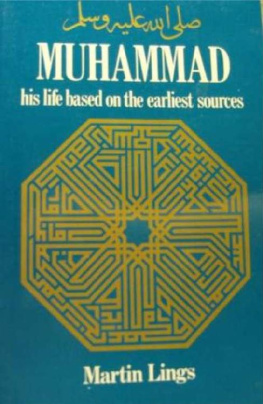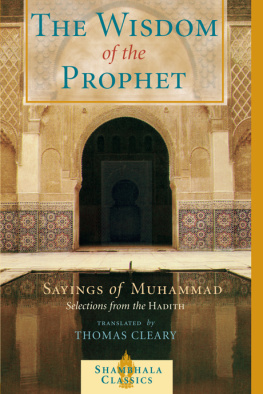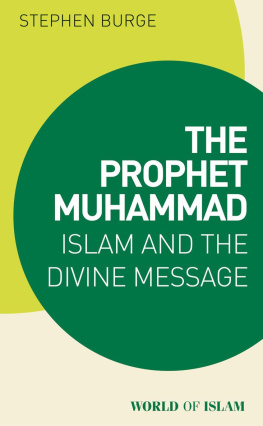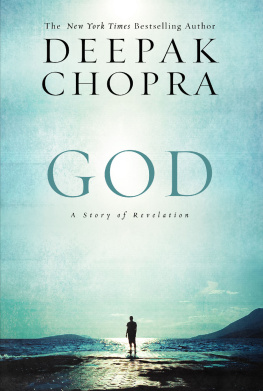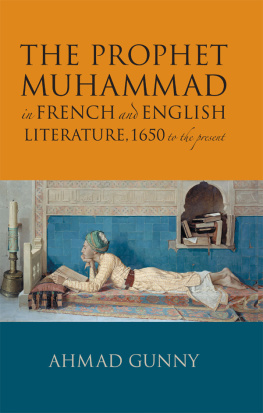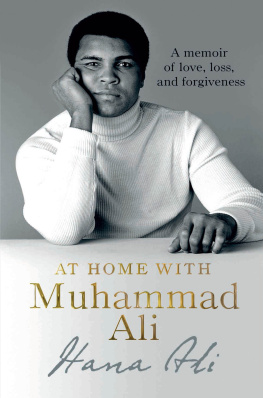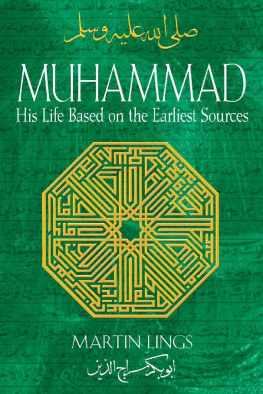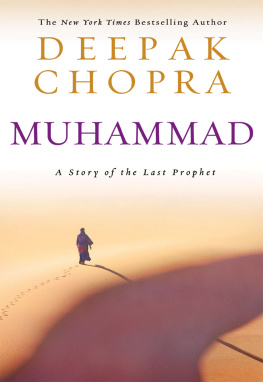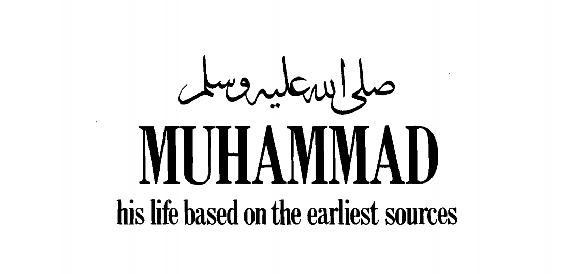
Muhammad: His Life Based on the Earliest Sources is an award-winning 1983 biography of the Islamic prophet Muhammad by Martin Lings.
The book provides a new account of the sira or the life of Muhammad, with details that had not been elaborated in other accounts. It is based primarily on old Arab sources that go back to the 8th century, of which some passages are translated for the first time. It is not contradictory to other accounts but rather offers new insights and new details. The book also includes excerpts from original English translations of speeches by men and women who lived close to Muhammad, heard him speak, witnessed his actions, witnessed the way he interacted with situations and witnessed events he encountered throughout various stages of his life.
Scrupulous and exhaustive in its fidelity to its sources, Muhammad: His Life Based on the Earliest Sources is presented in a narrative style that is easily comprehensible, yet authentic and inspiring in its use of language, reflecting both the simplicity and grandeur of the story it tells. The book has been published in 12 languages and has received numerous awards, including acknowledgment as best biography of the prophet in English at the National Seerat Conference in Islamabad.
Publisher note: This version has been formatted for .EPUB and .MOBI formats so many footnotes, page numbers, and references have been altered and/or omitted as a result. Please see the original physical or PDF version for complete footnotes with page numbers and full references. -Digital Deen Publications, May 2017.
CONTENTS
The House of God
A Great Loss
Quraysh of the Hollow
The Recovery of a Loss
The Vow to Sacrifice a Son
The Need for a Prophet
The Year of the Elephant
The Desert
Two Bereavements
Bahira the Monk
A Pact of Chivalry
Questions of Marriage
The Household
The Rebuilding of the Ka'bah
The First Revelations
Worship
"Warn Thy Family"
Quraysh Take Action
Aws and Khazraj
Abu Jahl and Harnzah
Quraysh Make Offers and Demands
Leaders of Quraysh
Wonderment and Hope
Family Divisions
The Hour
Three Questions
Abyssinia
'Umar
The Ban and its Annulment
Paradise and Eternity
The Year of Sadness
"The Light of Thy Countenance"
After the Year of Sadness
Yathrib Responsive
Many Emigrations
A Conspiracy
The Hijrah
The Entry into Medina
Harmony and Discord
The New Household
The Threshold of War
The March to Badr
The Battle of Badr
The Return of the Vanquished
The Captives
Bani Qaynuqa'
Deaths and Marriages
The People of the Bench
Desultory Warfare
Preparations for Battle
The March to Uhud
The Battle of Uhud
Revenge
The Burial of the Martyrs
AfterUhud
Victims of Revenge
Bani Nadir
Peace and War
The Trench
The Siege
Bani Qurayzah
After the Siege
The Hypocrites
The Necklace
The Lie
The Dilemma of Quraysh
"A Clear Victory"
After Hudaybiyah
Khaybar
"Whom Lovest Thou Most?"
After Khaybar
The Lesser Pilgrimage and its Aftermath
Deaths and the Promise of a Birth
A Breach of the Armistice
The Conquest of Mecca
The Battle of Hunayn and the Siege of Ta'if
Reconciliations
After the Victory
Tabuk
After Tabuk
The Degrees
The Future
The Farewell Pilgrimage
The Choice
The Succession and the Burial
REFERENCES
Map of Arabia (by Steven W. Johnson)
Quraysh of the Hollow (genealogical tree)
Note on Pronunciation of Arabic Names
Key of References
MUHAMMAD
his life based on the earliest sources
The House of God
THE Book of Genesis tells us that Abraham was childless, without hope of children, and that one night God summoned him out of his tent and said to him: "Look now towards heaven, and count the stars if thou art able to number them." And as Abraham gazed up at the stars he heard the voice say: "So shall thy seed be."'
Abraham's wife Sarah was then seventy-six years old, he being eighty-five; and she gave him her handmaid Hagar, an Egyptian, that he might take her as his second wife. But bitterness of feeling arose between the mistress and the handmaid, and Hagar fled from the anger of Sarah and cried out to God in her distress. And He sent to her an Angel with the message: "I will multiply thy seed exceedingly, that it shall not be numbered for multitude." The Angel also said to her: 'Behold, thou art with child, and shalt bear a son, and shalt call his name Ishmael; because the Lord hath heard thy affliction." Then Hagar returned to Abraham and Sarah and told them what the Angel had said; and when the birth took place, Abraham named his son Ishmael, which means "God shall hear".
When the boy reached the age of thirteen, Abraham was in his hundredth year, and Sarah was ninety years old; and God spoke again to Abraham and promised him that Sarah also should bear him a son who must be called Isaac. Fearing that his elder son might thereby lose favour in the sight of God, Abraham prayed: "O that Ishmael might live before Thee! " And God said to him: "As for Ishmael, I have heard thee. Behold, I have blessed him ... and I will make him a great nation. But My covenant will I establish with Isaac, which Sarah shall bear unto thee at this set time in the next year.
Sarah gave birth to Isaac and it was she herself who suckled him; and when he was weaned she told Abraham that Hagar and her son must no longer remain in their household. And Abraham was deeply grieved at this, on account of his love for Ishmael; but again God spoke to him, and told him to follow the counsel of Sarah, and not to grieve; and again He promised him that Ishmael should be blessed.
Not one but two great nations were to look back to Abraham as their father - two great nations, that is, two guided powers, two instruments to work the Will of Heaven, for God does not promise as a blessing that which is profane, nor is there any greatness before God except greatness in the Spirit. Abraham was thus the fountain-head of two spiritual streams, which must not flow together, but each in its own course; and he entrusted Hagar and Ishmael to the blessing of God and the care of His Angels in the certainty that all would be well with them.
Two spiritual streams, two religions, two worlds for God; two circles, therefore two centres. A place is never holy through the choice of man, but because it has been chosen in Heaven, There were two holy centres within the orbit of Abraham: one of these was at hand, the other perhaps he did not yet know; and it was to the other that Hagar and Ishmael were guided, in a barren valley of Arabia, some forty camel days south of Canaan. The valley was named Becca, some say on account of its narrowness: hills surround it on all sides except for three passes, one to the north, one to the south, and one opening towards the Red Sea which is fifty miles to the west. The Books do not tell us how Hagar and her son reached Becca; perhaps some travellers took care of them, for the valley was on one of the great caravan routes, sometimes called "the incense route", because perfumes and incense and such wares were brought that way from South Arabia to the Mediterranean; and no doubt Hagar was guided to leave the caravan, once the place was reached. It was not long before both mother and son were overcome by thirst, to the point that Hagar feared Ishmael was dying. According to the traditions of their descendants, he cried out to God from where he lay in the sand, and his mother stood on a rock at the foot of a nearby eminence to see if any help was in sight. Seeing no one, she hastened to another point of vantage, but from there likewise not a soul was to be seen. Half distraught, she passed seven times in all between the two points, until at the end of her seventh course, as she sat for rest on the further rock, the Angel spoke to her. In the words of Genesis:
Next page
